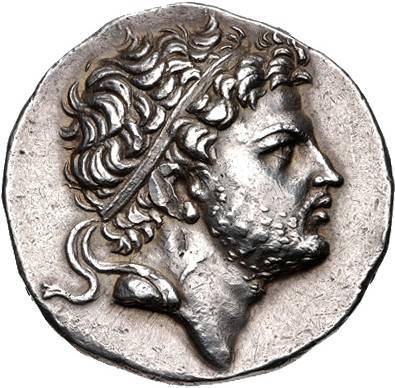
Perseus of Macedon
Perseus (Greek: Περσεύς, romanized: Perséus; c. 212 – 166 BC) was king of the ancient kingdom of Macedon from 179 until 168 BC. He is widely regarded as the last king of Macedonia and the last ruler from the Antigonid Dynasty, as his defeat by Rome at the Battle of Pydna during the Third Macedonian War effectively ended Macedonia as an independent political entity.[1][2]
Perseus
179–168 BC
Monarchy abolished
(Andriscus claimed in 149 BC)
166 BC (aged 46)
Alba Fucens, Italy, Roman Republic
Περσεύς (Perseus)
Early life[edit]
Perseus was the son of king Philip V of Macedon and a concubine, probably Polycratia of Argos.[3] His father spent most of his reign attempting to maintain Macedonian hegemony over Greece against heavy Greek resistance and, in his later reign, against an expansionist Roman Republic. Philip V failed in this endeavor: following defeat in the Second Macedonian War he was compelled to accept Roman power in Greece, and later helped Rome in the War against Nabis (195 BC) and Aetolian War (191-189 BC).[4] Perseus is recorded as having commanded Macedonian troops in both the Second Macedonian War and Aetolian War. Being a son of a concubine, Perseus feared that the throne might pass on to his legitimate younger brother Demetrius, who had been sent as a hostage to Rome following the Second Macedonian War and now led a pro-Roman faction within the Macedonian court. In 180 BC Perseus forged a letter supposedly from the Roman general Titus Quinctius Flamininus, which suggested that Demetrius was planning to overthrow Philip V. This successfully convinced Philip V to execute Demetrius.[5] Philip died the next year and was succeeded by Perseus on 22 June 168 BC.